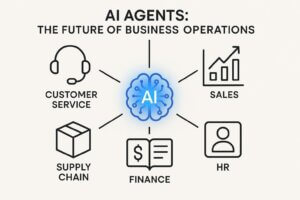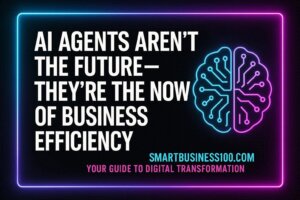With AI agents for business the artificial intelligence revolution is projected to contribute $15.7 trillion to the global economy by 2030, and at the forefront of this transformation are AI agents-sophisticated autonomous systems that are redefining how businesses operate. While many companies struggle with efficiency bottlenecks and scalability challenges, forward-thinking organisations are discovering that AI agents offer a powerful solution to these persistent problems.
In today’s hyper-competitive business landscape, the difference between market leaders and laggards often comes down to operational efficiency and the ability to scale intelligently. AI agents represent a paradigm shift from traditional automation tools, offering businesses the ability to delegate complex tasks to intelligent systems that can learn, adapt, and make decisions autonomously.
This comprehensive guide will explore how AI agents can transform your business operations, providing practical insights, real-world examples, and a clear roadmap for implementation. Whether you’re a small business owner looking to streamline operations or an enterprise executive seeking a competitive advantage, understanding AI agents is crucial for future success.

What Is an AI Agent and How Does It Work?
An AI agent is an autonomous software entity that perceives its environment, processes information, and takes actions to achieve specific goals without constant human intervention. Unlike traditional software that follows predetermined rules, AI agents use machine learning and advanced algorithms to make decisions, learn from outcomes, and continuously improve their performance.
Understanding AI Agent Technology
At its core, AI agent technology combines several sophisticated components:
- Perception Layer: AI agents gather data from various sources, including databases, APIs, sensors, and user interactions
- Processing Engine: Advanced algorithms analyse data, recognise patterns, and generate insights
- Decision Framework: Machine learning models evaluate options and select optimal actions
- Action Execution: The agent implements decisions through integrated systems and interfaces
- Learning Mechanism: Continuous feedback loops enable improvement over time
What sets autonomous AI agents apart from conventional automation is their ability to handle ambiguity and adapt to new situations. For instance, while a traditional chatbot might struggle with unexpected queries, an AI agent can understand context, infer intent, and provide relevant responses even to novel questions.
Key Components of Modern AI Agents
Modern AI agents incorporate several cutting-edge technologies:
Natural Language Processing (NLP) enables AI agents to understand and generate human language, making them invaluable for customer service and communication tasks. Computer Vision allows agents to process visual information, essential for quality control and security applications. Predictive Analytics empowers agents to forecast trends and make proactive decisions.
The integration of these components creates intelligent virtual assistants capable of handling complex business processes. For example, an AI agent in finance might simultaneously monitor market conditions, analyse portfolio performance, execute trades, and generate reports—all while adapting its strategies based on real-time data.
AI Agent Examples and Real-World Applications
The versatility of AI agents has led to their adoption across virtually every industry. Understanding these AI agent examples can help businesses identify opportunities for implementation in their own operations.
Customer Service and Support Automation
One of the most visible applications of AI agents is in customer service, where they’re revolutionising how businesses interact with clients. Unlike basic chatbots, modern conversational AI agents can:
- Handle complex, multi-step customer inquiries
- Access and update customer records in real-time
- Escalate issues intelligently to human agents when necessary
- Learn from each interaction to improve future responses
A leading telecommunications company recently deployed AI agents to handle technical support, resulting in a 67% reduction in average resolution time and a 45% improvement in customer satisfaction scores. The AI agents could diagnose network issues, guide customers through troubleshooting steps, and even schedule technician visits when needed.
Sales and Marketing AI Agents
In sales and marketing, AI agents are transforming how businesses identify, engage, and convert prospects. These enterprise AI solutions can:
Lead Qualification: AI agents analyse prospect behaviour, engagement patterns, and demographic data to score leads automatically, ensuring sales teams focus on the most promising opportunities.
Personalised Outreach: By analysing customer data and preferences, AI agents craft personalised email campaigns, social media messages, and content recommendations that resonate with individual prospects.
Sales Forecasting: Advanced AI agents process historical data, market trends, and pipeline information to provide accurate sales predictions, helping businesses make informed strategic decisions.
A B2B software company implemented AI agents for lead nurturing and saw a 312% increase in qualified leads within six months. The agents automatically engaged prospects with relevant content, scheduled demos, and provided sales teams with detailed insights about each lead’s interests and pain points.
Operations and Process Management
Perhaps the most transformative applications of AI agents lie in operations and process management, where they’re creating truly digital workforce solutions. These agents excel at:
Supply Chain Optimisation: AI agents monitor inventory levels, predict demand fluctuations, and automatically adjust orders to prevent stockouts while minimising carrying costs. A major retailer using AI agents for supply chain management reported a 23% reduction in inventory costs and a 98.5% order fulfilment rate.
Financial Process Automation: In accounting and finance, AI agents process invoices, reconcile accounts, detect anomalies, and generate reports. They can identify potential fraud, ensure compliance, and provide real-time financial insights that would take human teams days to compile.
Human Resources Management: AI agents streamline recruitment by screening resumes, scheduling interviews, and even conducting initial assessments. They also handle routine HR queries, process leave requests, and monitor employee engagement metrics.

Implementing AI Agents in Your Business
Successfully implementing AI agents requires a strategic approach that aligns technology capabilities with business objectives. Here’s how to ensure your AI agent deployment delivers maximum value.
Step-by-Step Implementation Guide
Step 1: Identify High-Impact Use Cases
Begin by analysing your business processes to identify areas where AI agents can deliver the most value. Look for tasks that are:
- Repetitive and time-consuming
- Data-intensive requiring analysis
- Customer-facing with high volume
- Critical for business operations but prone to human error
Step 2: Choose the Right AI Agent Platform
Selecting appropriate AI agent platforms is crucial for success. Consider factors such as:
- Integration capabilities with existing systems
- Scalability to meet future needs
- Security and compliance features
- Customization options
- Vendor support and expertise
Step 3: Develop a Pilot Program
Start with a pilot project to test AI agent capabilities and refine your approach. Choose a specific use case with clear success metrics and a limited scope. This allows you to demonstrate value quickly while minimising risk.
Step 4: Ensure Proper AI Agent Integration
Successful AI agent integration requires careful planning:
- Map data flows between AI agents and existing systems
- Establish APIs and connection protocols
- Define security parameters and access controls
- Create backup and failover procedures
Step 5: Train and Deploy
Proper training is essential for AI agent effectiveness. This includes:
- Feeding historical data to establish baseline performance
- Setting up feedback mechanisms for continuous learning
- Training staff on how to work alongside AI agents
- Establishing monitoring and quality assurance processes
Measuring ROI and Success Metrics
Demonstrating AI agent ROI is critical for justifying investment and scaling initiatives. Key metrics to track include:
Efficiency Metrics:
- Task completion time reduction
- Volume of transactions processed
- Error rate improvements
- Resource utilisation optimisation
Financial Metrics:
- Cost savings from automation
- Revenue increase from improved processes
- Return on investment timeline
- Total cost of ownership
Quality Metrics:
- Customer satisfaction scores
- Employee productivity improvements
- Compliance and accuracy rates
- Innovation and new capability metrics
A financial services firm implementing AI agents for loan processing saw remarkable results: processing time decreased from 5 days to 4 hours, accuracy improved to 99.7%, and they achieved full ROI within 8 months. The AI agent benefits extended beyond efficiency, enabling them to offer 24/7 service and expand into new markets.
Conclusion
AI agents represent a fundamental shift in how businesses operate, offering unprecedented opportunities for efficiency, scalability, and innovation. From customer service to complex operational processes, these autonomous AI agents are proving their value across industries and use cases.
The key to success lies in strategic implementation—identifying the right use cases, choosing appropriate platforms, and measuring results systematically. As AI technology continues to advance, businesses that embrace AI agents today will be best positioned to compete in tomorrow’s market.
The question is no longer whether to implement AI agents, but how quickly you can begin transforming your operations. With the right approach and clear objectives, AI agents can deliver substantial returns while positioning your business at the forefront of the digital revolution.
Ready to explore how AI agents can transform your business? Visit SmartBusiness100.com for more insights on implementing cutting-edge business solutions and staying ahead of the competition.
Frequently Asked Questions
What’s the difference between AI agents and chatbots?
While chatbots typically follow scripted responses and handle simple queries, AI agents are autonomous systems capable of learning, making complex decisions, and executing multi-step processes. AI agents can understand context, adapt to new situations, and integrate with multiple business systems to complete tasks independently.
How much do AI agents cost?
AI agent pricing varies significantly based on complexity and scale. Basic AI agent solutions start around $500-2,000 per month for small businesses, while enterprise-grade platforms can range from $10,000-100,000+ monthly. Factors affecting cost include customisation needs, integration requirements, and transaction volumes. Most businesses see positive ROI within 6-12 months.
Can AI agents integrate with existing systems?
Yes, modern AI agents are designed for seamless integration with existing business systems, including CRM, ERP, databases, and communication platforms. Most AI agent platforms offer APIs, webhooks, and pre-built connectors for popular business software. Integration complexity depends on your current infrastructure and the specific AI agent solution chosen.
What industries benefit most from AI agents?
While AI agents provide value across all sectors, industries seeing the greatest benefits include financial services (fraud detection, loan processing), healthcare (patient scheduling, diagnosis assistance), retail (inventory management, customer service), manufacturing (quality control, predictive maintenance), and technology (IT support, software development). Any industry with repetitive processes or high customer interaction volumes can benefit significantly.
How secure are AI agents?
AI agent security depends on the platform and implementation. Leading AI agent solutions incorporate enterprise-grade security features, including encryption, access controls, audit trails, and compliance certifications (SOC 2, GDPR, HIPAA). When properly configured, AI agents can actually enhance security by reducing human error and providing consistent policy enforcement. Always verify security credentials and conduct thorough assessments before deployment.


